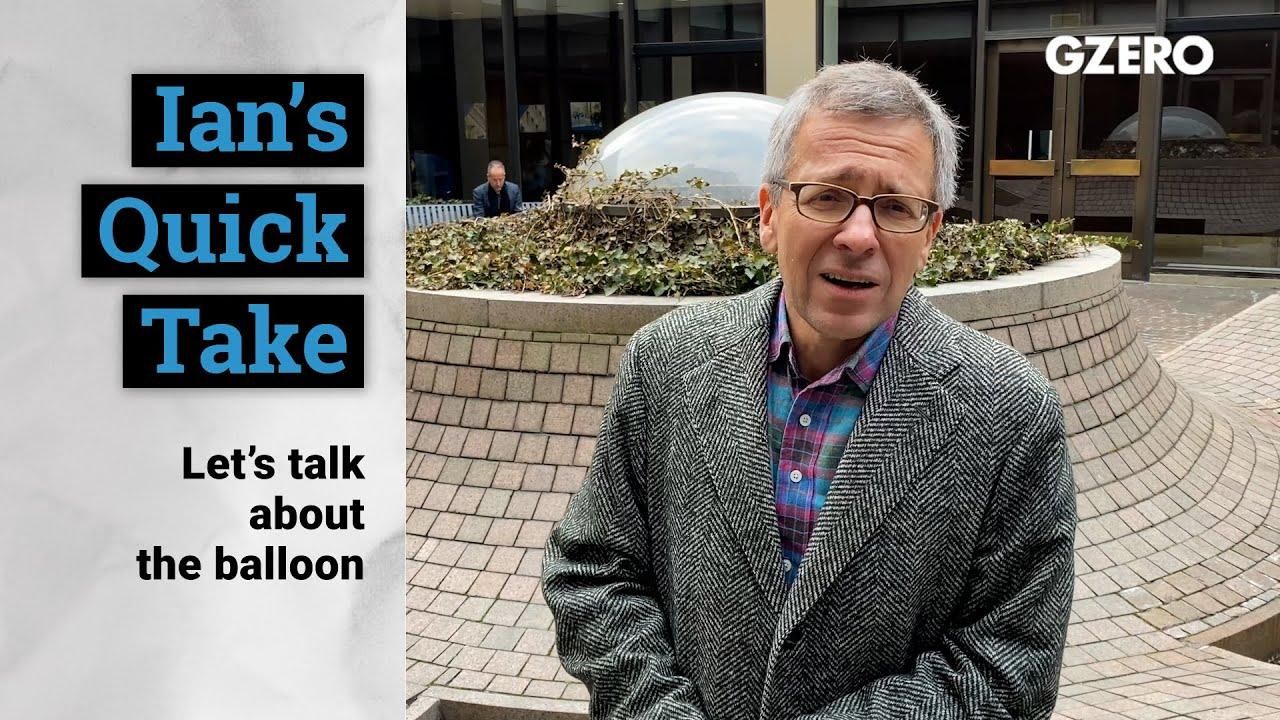
Ian Bremmer's Quick Take: Hi, everybody. Ian Bremmer here and I'm at Columbia University, just about to teach my class. I just got back to New York and a Quick Take to kick off your week.
Of course, what we're talking about right now is the balloon, which was made for television. I mean, you know, you get to watch on the map as it's traveling across the country and check the popularity ratings. Democrats, Republicans, what do you think about the balloon? The reality is this is not going to be talked about in another week, but it is inconvenient, the timing for a few different reasons. First of all, because you have the State of the Union coming up tomorrow. And as a consequence, President Biden is going to have to address it in a very public way, and therefore it puts more of a chill in US-China relations.
Secondly, it came right before Secretary of State Blinken's planned trip to Beijing that was going to include unusually a meeting directly with Xi Jinping. That's something that both Biden and Xi really wanted to get done. And now it has been postponed, frankly, without a date, at least in the near-term future, that it is going to be reset for.
And then finally, because the Chinese have been trying to engage in a charm offensive, certainly since ending the zero-COVID policy, making it an everyone-gets-COVID policy and wanting to show stronger Chinese growth, meaning opening up. And that means talking about reopening the economy, trying to ensure that people in the international markets, investments, are feeling more comfortable doing business with China. This puts a chill on all of that in the context and against the backdrop of what has been some challenging US-China politics.
For example, secondary sanctions against the Chinese company in the last week for doing business with the Wagner Group in Russia. Investigative work that has shown the Chinese have been sending more military equipment, related equipment, not direct arms and materiel, but spare parts, jamming equipment and the like that has helped the Russians with the war in Ukraine, something that the Chinese had been very wary to do in the initial months. Looks like they may be loosening there, and the Americans aren't happy about that.
And then, of course, you have the continued politics around things like Taiwan, the potential for direct confrontation there. You've got further export controls on semiconductors. It doesn't feel like it's a very happy relationship right now. And yet, President Biden and President Xi both want to put a floor under that relationship. They want it to be more stable than it's been, in part because the American private sector that spends a lot of money in lobbying for policies want to continue to do business with the Chinese, and in part because all American allies want tighter security with the US but they also want to continue to have large amounts of economic exposure to China.
Are there any lessons that are learned from here? Well, one is that China makes mistakes. This was clearly a mistake. Yes, there have been other incidents of balloons cutting across the United States for smaller amounts of time during the Trump administration. Apparently, Trump was not aware. The US was not aware of it at the time. Maybe Xi Jinping thought he could get away with this much larger balloon over the course of several days. He was badly advised. Some heads probably rolling internally in defense over in China.
Secondarily. Biden himself is constrained when this stuff gets public. We saw it before with Nancy Pelosi's trip to Taiwan. Biden had been trying to stop Nancy Pelosi, the former speaker, from making that trip. It got public, the trip got leaked, and then suddenly Democrats and Republicans are all in the crossfire of, "You can't look weak, you can't look weak on China." As a consequence, Biden had to back off, support the trip. And then you saw military escalation from the Chinese as a consequence. That's exactly what happened here.
Before the public knew about this balloon, Biden was still very much planning on sending Blinken to China and to meet with Xi Jinping. Biden knew about the balloon. The White House knew. The public didn't and as a consequence, Biden said, "I can still send the secretary of state." As soon as it became public. He had to back off. He also had to shoot the thing down, which, frankly, I suspect he wasn't going to do right before a Blinken trip if it hadn't made it into the public.
In other words, the reality of polarization in the US political system and the performative nature of, "we've got to take these guys on," can undermine US national security interests and can make escalation more likely between the two most powerful countries in the world.
- Biden and Xi’s Bali face-off: Agenda, forecast, and sticking points ›
- What We're Watching: US military in the Philippines, Ecuadorian referendum, Israel's AG vs. Bibi, Ukraine shows EU anti-corruption love, China's snoop balloon ›
- What We're Watching: US-China balloon fallout, Iranian "amnesty" ›
- Lessons from “balloon-gate” - GZERO Media ›
- Canada is "eyes wide open" on China, says defense minister - GZERO Media ›